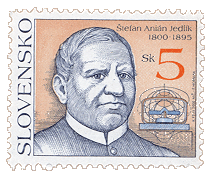 |
||
| Personalities Štefan Anián Jedlík |
||
| Catalogue Number: | 202 |
| Stamp Design: | Karol Felix |
| Stamp Drawing: | Martin Činovský |
| Stamp Engraving: | František Horniak |
| Date of Issue: | January 11, 2000 |
| Printing: | Postal Stationery Printing House, Prague, Czech Republic |
| Print Technology: | Rotary recess printing combined with recess printing |
| Size of Impression: | 30.0 mm x 23.0 mm |
| Print Run: | 3,000,000 |
| FDC Design: | Karol Felix |
| FDC Engraving: | František Horniak |
| Cancellation Design: | Karol Felix |
| FDC Printing: | Postal Stationery Printing House, Prague, Czech Republic |
| FDC Print Technology: | Recess printing from flat plates |
| FDC Print Run: | 10,000 |
|
Štefan Anián Jedlík (born 11th January 1800 in Zemné, county Nitra - died 12th December 1897 in Gyor, Hungary) - a physicist, inventor, pedagogue, since 1858 a member of the Hungarian Academy of Sciences. |
|
